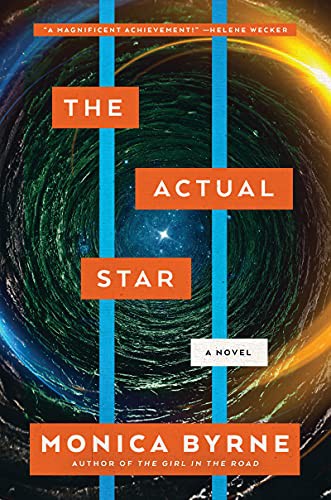sol2070@velhaestante.com.br reviewed The Actual Star by Monica Byrne
Science fiction as I've always wanted it
5 stars
(em português → sol2070.in/2023/09/Fic%C3%A7%C3%A3o-cient%C3%ADfica-como-sempre-quis )
"The Actual Star" (2022), by Monica Byrne, is the kind of book I'm always looking for in science fiction, but rarely find. It combines several of the topics that interest me most today: post-apocalyptic utopia, anarchism, psychedelics, climate emergency, regenerative technologies, cosmo-spiritual questions, etc.
The summary doesn't look like much: three interconnected stories set a thousand years apart - in 1012, 2012 and 3012 - that use Maya mythology to talk about reincarnation, collapse and regeneration. In fact, as soon as I read the synopsis, I wished distance, imagining something new age, with "age of Aquarius", Maya calendar, or "conspirituality". At the very least, it sounded like a hackneyed story, like that average movie "Cloud Atlas" (2012), by the Wachowski, or the great "The Fountain" (2006), by Darren Aronofsky.
But I saw a lot of effusive praise, even from people I admire …
(em português → sol2070.in/2023/09/Fic%C3%A7%C3%A3o-cient%C3%ADfica-como-sempre-quis )
"The Actual Star" (2022), by Monica Byrne, is the kind of book I'm always looking for in science fiction, but rarely find. It combines several of the topics that interest me most today: post-apocalyptic utopia, anarchism, psychedelics, climate emergency, regenerative technologies, cosmo-spiritual questions, etc.
The summary doesn't look like much: three interconnected stories set a thousand years apart - in 1012, 2012 and 3012 - that use Maya mythology to talk about reincarnation, collapse and regeneration. In fact, as soon as I read the synopsis, I wished distance, imagining something new age, with "age of Aquarius", Maya calendar, or "conspirituality". At the very least, it sounded like a hackneyed story, like that average movie "Cloud Atlas" (2012), by the Wachowski, or the great "The Fountain" (2006), by Darren Aronofsky.
But I saw a lot of effusive praise, even from people I admire like Kim Stanley Robinson and Cory Doctorow. I discovered that there's even an anarchist utopia and decided to give it a go. When I finished it, I got that feeling from the first paragraph; this is my kind of book.
The scifi setting is an extremely reduced, resilient and advanced civilization that has managed to overcome capitalism. While there are no governments, exploitation or hierarchies of power, a salvationist religion predominates, with its origins in 2012, dating back to the Maya.
The pace is uneven. There are page-turning sequences, and many that aren't so intense, describing scenarios, conversations, etc. But it's the kind of book that only reveals its full value at the end.
My worst expectations were shattered several times. I imagined that perhaps the story would glorify Maya culture, as is usually the case with new age tales. But no. There is an intense immersion, quite educational even, in an aspect considered repulsive, that of rituals with human sacrifice. It kind of blew my mind: there's a whole dimension to this that I was completely unaware of.
As the author has a background in science and the study of religions, I also feared that the story might be heading towards the commonplace of deconstructing religious myths. But wow... it's so much more than that!
The book is very current because it includes a planetary context of the "cli-fi" type (climate fiction). Nowadays, when I see an apocalyptic story that ignores this, inventing some other reason for the disastrous situation, I disregard it.
The futuristic part is not easy to follow. It involves perhaps hundreds of new words (the glossary at the end is essential). But the innovations in language are quite interesting. They accompany a gender evolution where everyone is intersex, at least physiologically, and reflect cultures from the global South that have come to dominate (decolonization is a central theme in the story), as well as fantastic technologies - for example, augmented reality in conjunction with endogenous doses of psilocybin, or extrasensory lobes.
There is also a lot of dialogue in Kriol, a dialect of Belize, in Central America, with similarities to English, which for English speakers is already very difficult to understand. For me, almost all of these sentences went unheard. But I was able to follow the story.
People were also offended by the intensely explicit descriptions of sex and mutilation. It really isn't for everyone's taste, but nothing that distracts too much from the plot.
Entropy A central element that I loved, and which has kept me thinking until now, was the discussion of entropy, the fact that every organized system faces a constant movement of degeneration. This is extrapolated to cosmological (e.g. the expansion of the universe into an icy void), spiritual (the mandatory separation from a primordial union) or social dimensions.
I was thinking a lot about a Hindu religious cosmology that is only indirectly referred to in the story. In this allegory, the creation of the universe was a game that the absolute divinity invented because she was bored. She would then forget that she is everything, omniscient and omnipresent, and let herself be fragmented into infinite particles and instants of limited consciousness. The extreme delight of this game would be the rich variety, instead of a static singularity, the dazzle of existence and self-discovery. Thus, existing is a game of divine pleasure. Each discovery or experience possesses a playful cosmic delight. (There's a whole book by the great Alan Watts ("The Book"), which is excellent, with a secular interpretation of this myth).
This cosmological allegory also appears a lot in reports of psychedelic journeys, even when the person doesn't know anything about Hinduism. There, they directly perceive and recognize every movement, including their own, as the cosmos, along with its meaning.
In the book, a character asks:
— How could anything know itself if it didn't separate?
This reference to the beauty that exists in separation, in entropy, is also something very significant in philosophical idealism, the idea that the nature of reality is mental, not material. There is the appearance that experiences and phenomena are separate from consciousness, but a thorough examination can reveal otherwise.
The book ends with the best final sentence I've ever read (no danger of spoilers):
— How had she ever forgotten?—that it was just as much pleasure to disperse as be whole.




